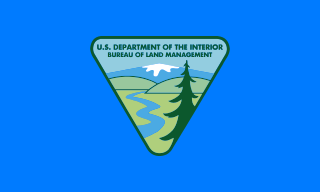
The Bureau of Land Management (BLM) is an agency within the United States Department of the Interior responsible for administering U.S. federal lands. Headquartered in Washington, D.C., the BLM oversees more than 247.3 million acres (1,001,000 km2) of land, or one-eighth of the United States's total landmass.
Natural ResourcesCanada is the department of the Government of Canada responsible for natural resources, energy, minerals and metals, forests, earth sciences, mapping, and remote sensing. It was formed in 1994 by amalgamating the Department of Energy, Mines and Resources with the Department of Forestry.

The Minerals Management Service (MMS) was an agency of the United States Department of the Interior that managed the nation's natural gas, oil and other mineral resources on the outer continental shelf (OCS).

The Mineral Leasing Act of 1920 30 U.S.C. § 181 et seq. is a United States federal law that authorizes and governs leasing of public lands for developing deposits of coal, petroleum, natural gas and other hydrocarbons, in addition to phosphates, sodium, sulfur, and potassium in the United States. Previous to the act, these materials were subject to mining claims under the General Mining Act of 1872.
The University of Texas School of Law is the law school of the University of Texas at Austin, a public research university in Austin, Texas. According to Texas Law’s ABA disclosures, 87.20% of the Class of 2022 obtained full-time, long-term bar passage required employment nine months after graduation.
Mineral rights are property rights to exploit an area for the minerals it harbors. Mineral rights can be separate from property ownership. Mineral rights can refer to sedentary minerals that do not move below the Earth's surface or fluid minerals such as oil or natural gas. There are three major types of mineral property: unified estate, severed or split estate, and fractional ownership of minerals.
The California Department of Conservation is a department within the government of California, belonging to the California Natural Resources Agency. With a team of scientists, engineers, environmental experts, and other specialists, the Department of Conservation administers a variety of programs vital to California's public safety, environment and economy. The department's mission is to manage California's working lands. It regulates oil, natural gas and geothermal wells; studies and maps earthquakes and other geologic phenomena; maps and classifies areas containing mineral deposits; ensures reclamation of land used for mining; and administers agricultural and open-space land conservation programs. A division within the department dedicated to encouraging beverage container recycling has been moved into the newly created Department of Resources Recovery and Recycling (CalRecycle). Despite the similar name, the Department of Conservation should not be confused with the California Conservation Corps, another department within the Natural Resources Agency, which provides work experience for young adults. The Department of Conservation often collaborates with its federal equivalents, such as the U.S. Geological Survey.
Oil and gas law in the United States is the branch of law that pertains to the acquisition and ownership rights in oil and gas both under the soil before discovery and after its capture, and adjudication regarding those rights.

The Gubkin Russian State University of Oil and Gas is a public university in Moscow, Russia. The university was founded in 1930 and is named after the geologist Ivan Gubkin. The university is colloquially known as Kerosinka, meaning 'kerosene stove'.
Thomas W. Wälde, former United Nations (UN) Inter-regional Adviser on Petroleum and Mineral Legislation, was Professor & Jean-Monnet Chair at the Centre for Energy, Petroleum and Mineral Law and Policy (CEPMLP), Dundee.

Offshore oil and gas in the United States provides a large portion of the nation’s oil and gas supply. Large oil and gas reservoirs are found under the sea offshore from Louisiana, Texas, California, and Alaska. Environmental concerns have prevented or restricted offshore drilling in some areas, and the issue has been hotly debated at the local and national levels.

Susan Elizabeth "Liz" Birnbaum served as Director of the Minerals Management Service in the United States from July 15, 2009, to May 27, 2010. Birnbaum was in charge of administering "programs that ensure the effective management of renewable energy [...] and traditional energy and mineral resources on the nation's Outer Continental Shelf, including the environmentally safe exploration, development, and production of oil and natural gas, as well as the collection and distribution of revenues for minerals developed on federal and American Indian lands."

The New Mexico Energy, Minerals and Natural Resources Department (EMNRD) is a state agency in New Mexico tasked with managing and protecting the natural and energy resources of New Mexico.
State trust lands were granted by the United States Congress to states upon entering the Union. These lands were designated to support essential public institutions which are primarily public schools. State trust land managers lease and sell these lands to generate revenue for current and future designated beneficiaries. Predominantly found in the western United States, 46 million acres of land are currently designated as trust lands and the proceeds from the lease and sale of these lands are distributed into a state's permanent fund and used for many purposes.

The Offshore Energy and Jobs Act is a bill that was introduced into the United States House of Representatives during the 113th United States Congress. The Offshore Energy and Jobs Act would revise existing law governing the leasing, operation, and development of oil and natural gas resources available in the Outer Continental Shelf (OCS). The bill is primarily supported by Republicans and is opposed by President Barack Obama.
United States energy law is a function of the federal government, states, and local governments. At the federal level, it is regulated extensively through the United States Department of Energy. Every state, the federal government, and the District of Columbia collect some motor vehicle excise taxes. Specifically, these are excise taxes on gasoline, diesel fuel, and gasohol. While many western states rely a great deal on severance taxes on oil, gas, and mineral production for revenue, most states get a relatively small amount of their revenue from such sources.

The Federal Lands Jobs and Energy Security Act is a bill that would require the Bureau of Land Management (BLM) to establish certain fees for activities related to the development of oil and gas on federal lands. A portion of those amounts along with a portion of fees from renewable energy projects on federal lands would be available to the agency, subject to appropriation, to cover the costs of activities aimed at increasing energy development on federal lands. The bill also would exempt lawsuits related to energy production on federal lands from the Equal Access to Justice Act (EAJA). In addition, the legislation would require the BLM to offer for sale at least 25 percent of onshore federal lands nominated by firms for oil and gas leasing. It was introduced in the United States House of Representatives during the 113th United States Congress. President Barack Obama threatened to veto the bill on November 19, 2013.

The Lowering Gasoline Prices to Fuel an America That Works Act of 2014 is a bill that would revise existing laws and policies regarding the development of oil and gas resources on the Outer Continental Shelf. The bill is intended to increase domestic energy production and lower gas prices.

The Ministry of Energy and Mineral Resources of the Republic of Indonesia is an Indonesian ministry responsible for providing assistance to the President and Vice President in performing government's affairs in the field of energy and mineral resources. The current minister is Arifin Tasrif.
As a legal document, the broad form deed severs a property into surface and mineral rights. This allows other individuals or organizations other than the land owners to purchase rights to resources below the surface. These parties also receive use of surface resources — such as wood or water — to facilitate gathering the resources below ground. Based on English legal theory but an American creation from the early 1900s, the broad form deed was used by land and coal companies in many states within the Appalachian Region.







